Hola amigos,
Cactusjumper wrote
Roy and Mike,
I don't know how I can make my position any clearer. The Jesuits in the final analysis were just men. As such they had all the frailties of the rest of us. In Roy's quote in bold, "some" does not equate to all, or even many. It means some.
Well that "some" is what we are debating isn't it? You seem to lean to the extreme low number (two, those admitted by Father Polzer) while we seem to be leaning the other way. The Society of Jesus was a very large operation as you know, it would be silly to say that ALL were mining gold, fishing for pearls and selling African slaves.
Cactusjumper also wrote
You will forgive me if I take Charles Di Peso's characterization of who the Pima "targeted", which in plain English says.........everyone, over your own conclusions. Now it's true that Di Peso was not a treasure hunter in the purest sense of the word, but he knew Pima history forward and backward.
Like all men he was not perfect, much like the Jesuits, which is why he made a mistake, in my opinion, as well as many of his peers, and placed the original location of Tumacacori in the wrong place. Despite that, his historical knowledge of the Upper Pima was head and shoulders above many in his field.
I don't mind whom you choose to accept or dismiss, and will point out that what I posted were the English translations of Pima testimony, letters of the actual Jesuits involved, not the re-processed version as given by any historian, however qualified. Di Peso could have spent his entire life living in the Pima tribe and studying all the documentation that exists, and what he publishes will be his take on it. I prefer to read the original testimonies and documents when ever possible, and avoid any "spin" put on by historians.
<I wrote>
"
.....little wonder that the Franciscans found the pimas to be virtually un-educated in the Catholic faith if you think about it."
<And Cactusjumper replied>
This statement does not match the history that I have read. When you say "Franciscans" can you give us a source for that information. Did it come from many Franciscans, or was it just a few. When Father Kino died there just wasn't anyone to fill his shoes. Many of natives went back to the old ways, mainly because they didn't have regular visits from the Jesuits. That's the history that I have read, perhaps you have read something better.
I gave you the exact passage in another thread, from Father Garces, from a letter he wrote reporting on the conditions that existed in Pimeria Alta on his arrival there shortly after the departure of the Jesuits. Make of it what you will. Garces may have been coloring his own history book to cast a shadow on the Jesuits and light on his Franciscans for all I know, but he did write it. But consider that the Pope who actually suppressed the Jesuits, Clement XIV, had been a member of the Franciscans, and had successfully gotten Bishop Palafox beatified over the Jesuit opposition.
Cactusjumper also wrote
It may be that everything you say about the Jesuits is true, I wasn't there......and neither were you.
Where did I ever say that I was there? I certainly do not recall ever saying that, in any form. I was not present when the Mayflower landed at Plymouth Rock, but feel confident that it did happen.
Cactusjumper also wrote
I was a treasure hunter who believed in Jesuit treasure, so I have argued your side of the debate for years. The facts on the ground and historically, don't support my old position.
Take care,
Joe
Well I respectfully disagree about the 'facts on the ground' for what I can see, they do support the fact of Jesuits operating mines, ranches and farming fields, besides even smelting operations. Not all Jesuit mines are lost, neither are all the evidences of their refining, or even of the gold itself; The still existing Jesuit churches also show the results - like the example posted in another thread, <"La Compania" church in Quito, Ecuador> which displays seven tons of gold. The Jesuits didn't get thrown out of so many different countries for baptising too many babies.
The 1751 Pima revolt which we have covered, is not the only instance we could look at; the Pimas rose in rebellion several times, and lest we forget some of the other tribes, lets take a quick peek at the 1740 Yaqui-Mayo rebellion;
Rebellion of the Yaqui, Pima, and Mayo Indians - Sinaloa and Sonora (1740). The Yaqui and Mayo Indians had lived in peaceful coexistence with the Spaniards since the early part of the Seventeenth Century. Ms. Deeds, in describing the causes of this rebellion, observes that the Jesuits had ignored "growing Yaqui resentment over lack of control of productive resources." During the last half of the Seventeenth Century, so much agricultural surplus was produced that storehouses needed to be built. These surpluses were used by the missionaries to extend their activities northward into the California and Pima missions. The immediate cause of the rebellion is believed to have been a poor harvest in late 1739, followed in 1740 by severe flooding which exacerbated food shortages.
Ms. Deeds also points out that the "increasingly bureaucratic and inflexible Jesuit organization obdurately disregarded Yaqui demands for autonomy in the selection of their own village officials." Thus, this rebellion, writes Ms. Deeds, was "a more limited endeavor to restore the colonial pact of village autonomy and territorial integrity." At the beginning of the revolt, an articulate leader named El Muni emerged in the Yaqui community. El Muni and another Yaqui leader, Bernabé, took the Yaquis' grievances to local civil authorities. Resenting this undermining of their authority, the Jesuits had Muni and Bernabé arrested.
The arrests triggered a spontaneous outcry, with two thousand armed indigenous men gathering to demand the release of the two leaders. The Governor, having heard the complaints of both sides, recommended that the Yaqui leaders go to Mexico City to testify personally before the Viceroy and Archbishop Vizrón. In February 1740, the Archbishop approved all of the Yaqui demands for free elections, respect for land boundaries, that Yaquis be paid for work, and that they not be forced to work in mines.
The initial stages of the 1740 revolt saw sporadic and uncoordinated activity in Sinaloa and Sonora, primarily taking place in the Mayo territory and in the Lower Pima Country. Catholic churches were burned to the ground while priests and settlers were driven out, fleeing to the silver mining town at Alamos. Eventually, Juan Calixto raised an army of 6,000 men, composed of Pima, Yaqui and Mayo Indians. With this large force, Calixto gained control of all the towns along the Mayo and Yaqui Rivers.
However, in August 1740, Captain Agustín de Vildósola defeated the insurgents. The rebellion, however, had cost the lives of a thousand Spaniards and more than 5,000 Indians. After the 1740 rebellion, the new Governor of Sonora and Sinaloa began a program of secularization by posting garrisons in the Yaqui Valley and encouraging Spanish residents to return to the area of rebellion. The Viceroy ordered the partition of Yaqui land in a "prudent manner." The Yaquis had obtained a reputation for being courageous warriors during the rebellion of 1740 and the Spanish handled them quite gingerly during the late 1700s. As a result, the government acquisition of Yaqui lands did not begin began until 1768.
<from
http://www.houstonculture.org/mexico/sonora.html
So here again,
we have the Indians going to the "evil" Spaniards with their complaints about the Jesuits, and the results are disastrous to the Indians. Does that ring right, if the whole mythos of the great protectors of the Indians, the Jesuits were so kind and caring of their flocks? It doesn't ring right to me.
I don't expect to change your mind on the Jesuits, Joe; but you are aware that they do not confine their activities to proselytizing the pagans and never have. You personally have a bone with the illegal Mexican 'invasion' of Arizona and the US - so perhaps you might be surprised to learn that American Jesuits support that invasion? If you think I am making this up, just look into the 'Kino Border Initiative' and who openly supports it. John McGarry, Provincial of the California Province of the Society of Jesus, and Thomas Smolich, President of Jesuit Conference of the United States—Smolich being the most powerful Jesuit in North America. Still think the Jesuits are and always were, the good guys?
When a large organization is found to be lying, do you not then view all of their statements with suspicion? <Example, the USAF and the 1947 Roswell incident; no less than four official versions, all somewhat different and admitting to lying.> Don't forget that the Jesuits today claim they never had any mines or treasures, and Polzer admits of two priests caught mining. This is hardly the worst sort of activities the Jesuits have been involved in, right up to today.
Good luck and good hunting, if you are completely convinced that all those stories of Jesuit treasures and lost mines are so much hot air, you have plenty of support from the Society of Jesus as well as several MODERN historians.
Oroblanco



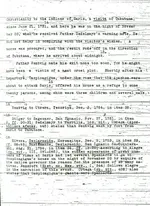
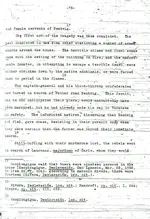
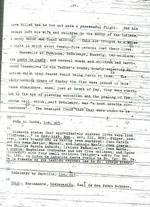
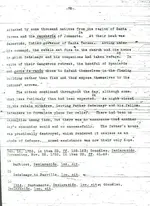
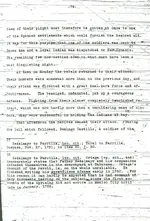
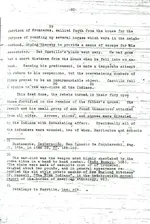
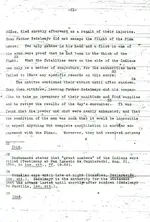
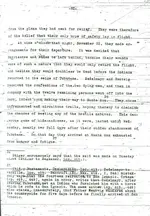
 ?
?


